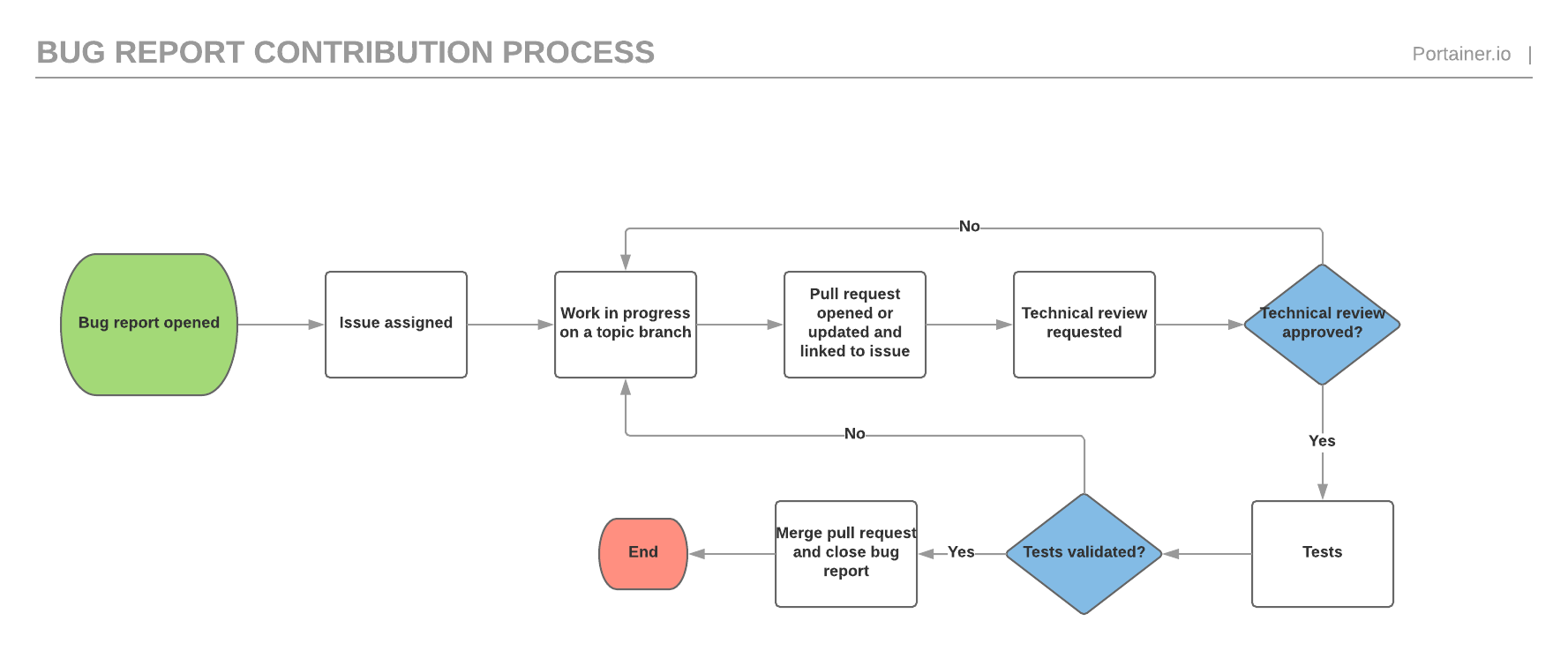# Contributing Guidelines
Some basic conventions for contributing to this project.
## General
Please make sure that there aren't existing pull requests attempting to address the issue mentioned. Likewise, please check for issues related to update, as someone else may be working on the issue in a branch or fork.
- Please open a discussion in a new issue / existing issue to talk about the changes you'd like to bring
- Develop in a topic branch, not master/develop
When creating a new branch, prefix it with the _type_ of the change (see section **Commit Message Format** below), the associated opened issue number, a dash and some text describing the issue (using dash as a separator).
For example, if you work on a bugfix for the issue #361, you could name the branch `fix361-template-selection`.
## Issues open to contribution
Want to contribute but don't know where to start? Have a look at the issues labeled with the `good first issue` label: https://github.com/portainer/portainer/issues?q=is%3Aopen+is%3Aissue+label%3A%22good+first+issue%22
## Commit Message Format
Each commit message should include a **type**, a **scope** and a **subject**:
```
<type>(<scope>): <subject>
```
Lines should not exceed 100 characters. This allows the message to be easier to read on github as well as in various git tools and produces a nice, neat commit log ie:
```
#271 feat(containers): add exposed ports in the containers view
#270 fix(templates): fix a display issue in the templates view
#269 style(dashboard): update dashboard with new layout
```
### Type
Must be one of the following:
- **feat**: A new feature
- **fix**: A bug fix
- **docs**: Documentation only changes
- **style**: Changes that do not affect the meaning of the code (white-space, formatting, missing
semi-colons, etc)
- **refactor**: A code change that neither fixes a bug or adds a feature
- **test**: Adding missing tests
- **chore**: Changes to the build process or auxiliary tools and libraries such as documentation
generation
### Scope
The scope could be anything specifying place of the commit change. For example `networks`,
`containers`, `images` etc...
You can use the **area** label tag associated on the issue here (for `area/containers` use `containers` as a scope...)
### Subject
The subject contains succinct description of the change:
- use the imperative, present tense: "change" not "changed" nor "changes"
- don't capitalize first letter
- no dot (.) at the end
## Contribution process
Our contribution process is described below. Some of the steps can be visualized inside Github via specific `status/` labels, such as `status/1-functional-review` or `status/2-technical-review`.
### Bug report

### Feature request
The feature request process is similar to the bug report process but has an extra functional validation before the technical validation as well as a documentation validation before the testing phase.

## Build Portainer locally
Ensure you have Docker, Node.js, yarn, and Golang installed in the correct versions.
Install dependencies with yarn:
```sh
$ yarn
```
Then build and run the project:
```sh
$ yarn start
```
Portainer can now be accessed at <http://localhost:9000>.
Find more detailed steps at <https://documentation.portainer.io/contributing/instructions/>.
## Adding api docs
When adding a new resource (or a route handler), we should add a new tag to api/http/handler/handler.go#L136 like this:
```
// @tag.name <Name of resource>
// @tag.description a short description
```
When adding a new route to an existing handler use the following as a template (you can use `swapi` snippet if you're using vscode):
```
// @id
// @summary
// @description
// @description **Access policy**:
// @tags
// @security jwt
// @accept json
// @produce json
// @param id path int true "identifier"
// @param body body Object true "details"
// @success 200 {object} portainer. "Success"
// @success 204 "Success"
// @failure 400 "Invalid request"
// @failure 403 "Permission denied"
// @failure 404 " not found"
// @failure 500 "Server error"
// @router /{id} [get]
```
explanation about each line can be found (here)[https://github.com/swaggo/swag#api-operation]